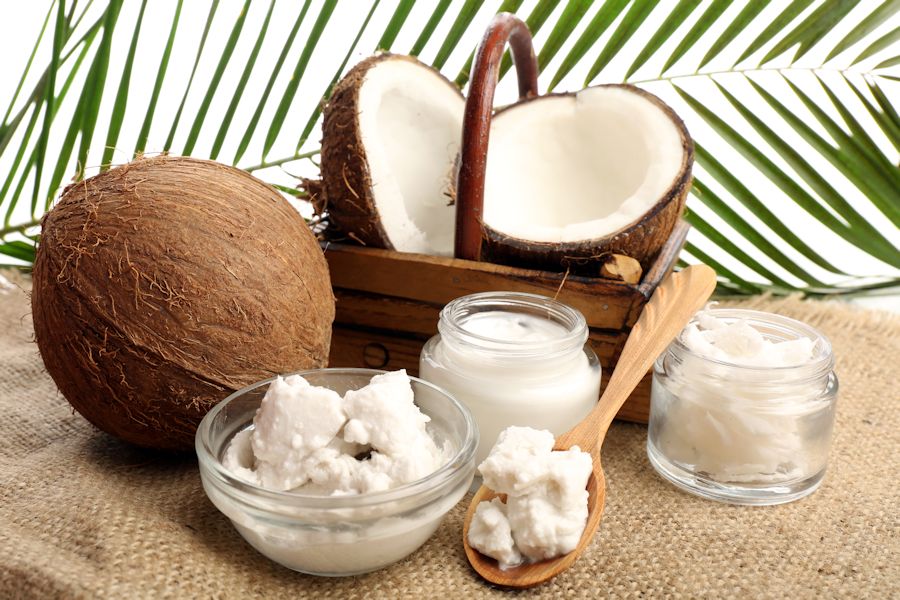Last Updated on April 4, 2018 by Nick

Coconut with jars of coconut oil and cosmetic cream on sackcloth on natural background
Did you know that over decades Coconut oil has received negative publicity, as the other saturated fats, for political and economic reasons? Yes, that’s right.
The Soybean Oil and Corn Production Industry, with the help of national authority, declared that coconut oil has unhealthy saturated fats, so they can successfully sell refined soybean oil and corn.
Which are actually harmful because of its high content of polyunsaturated fatty acids that will oxidize easily and cause many modern diseases.
Today it’s a completely different story.
Let’s take a look at some of the amazing benefits and nutritional value this oil has.
Contents
Nutrition Value And Key Ingredients of Coconut Oil
Coconut oil has incredible nutritional value and pharmacological action.
It is the of the healthiest oil that affects your entire system.
The key ingredient of coconut oil is lauric acid, which has a very antiviral and antibacterial activity and thus protects against many infectious diseases.
Lauric Acid is only found in breast milk, which consists of a vital ingredient because it protects the child from various infections while its own immune system is not yet fully developed.
Another ingredient is coconut oil is caprylic acids that stimulate the growth of good bacteria, in particular, lactic acid bacteria.
However, research showed that caprylic acid is effective against Candida and destroys parasites in the digestive tract.
How Coconut Oil Benefits The Digestive System?
The so-called medium-chain fatty acid (MCFA) in coconut oil is easily digested and absorbed in the body.
Unlike other oils, coconut oil’s fats do not burden the digestive system and internal organs. They give a quick energy and encourage healing abilities of serious diseases.
Good digestibility of this oil is very important for people with digestive problems who have difficulty digesting fat so that coconut oil helps to exploit the vitamin dissolves in fat (A, D, K, E).
Body Fat (MCFA)
MCFA Fatty acids of coconut oil can not be stored in the body as fat reserves because it does not circulate through the bloodstream rather than directly through the port vein transported to the liver where they immediately converted into energy.
As we get older, our bodies do not work as before, the pancreas produces less enzymes necessary for digestion, we absorb fewer vitamins and minerals from foods and whole digestive system hinders.
Protects the Skin And It’s Often Used for Massage
Coconut oil is excellent as a massage oil and skin care. Creates a barrier against infection, makes the skin softer, prevents the formation of wrinkles and age spots. Fine coconut oil molecules easily penetrate the skin and stimulate the connective tissue which contributes to the strength and elasticity of the skin.
High Temperature Resistant
Coconut oil is very resistant to high temperature and can be used in food preparation, frying and baking, as a salad dressing, in addition to cooked rice or prepare smoothies.
How Much Should You Take And What’s The Recommended Dosage?
Daily intake of coconut oil, can cause a slight increase in body temperature due to the increasing metabolism power it has, while your body is burning the mid range chain fatty acids.
Coconut oil gives you more energy and a sense of a full stomach, so the body requires less food rich in sugar and starch (complex carbohydrates), which facilitates a gradual transition to a healthier diet.
The moderate therapeutic dose is 2-3 tablespoons of oil a day to get enough lauric acid that strengthens the immune system.
Be sure to buy the cold pressed coconut oil (virgin) in health food stores or herbal pharmacies, avoid the refined that might be found in ordinary stores which is often quite cheap.
This refined and hardened coconut oil has extracted solids that remain after cold pressing. Extraction is carried out with the help of a high temperature and then it’s hydrogenated as “butter”.
This fat does not have the same characteristics as cold-pressed oil.
At cold temperature the coconut oil is in the solid state, and at around 23 C (74 F) degrees it begins to be liquid. Therefore, we can say that in the winter we have coconut butter, and in the summer, we have coconut oil.




